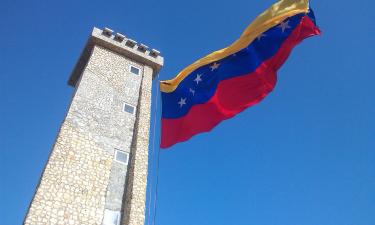Luck Was a Lady for the U.S: Could Lady Luck be Running Out?
Has the United States been lucking in its history? Der Voron presents a provocative look why the United States has found itself on top of the world
Luck No 1: North America and most of South America were colonies, of Great Britain and Spain and Portugal, respectively; also Mexico, Florida, and California were Spain's colonies in North America. Here is what happened after the colonies became independent (except Canada): Former British colonies united into one country (United States); and Former Spanish colonies did not unite into one country.
Perhaps this contributed to the independence gained by the former Spanish colonies, but also made competition with the former British colonies (i.e., United States) harder because they competed not only with the United States but also with each other. The United States could and did use contradictions between the many Latin American countries. An example is the destructive war between Paraguay and a coalition of Argentina, Brazil, and Uruguay, which lasted from 1860 to 1870. It lead to full destruction of Paraguay and damaged Uruguay, Argentina, and Brazil economies. Seems it was easier for the Latin Americans to call inhabitants of the United States "gringos" than just to unite into one country. The language issue wouldn't present a problem for them since it was one and the same (Spanish) except Brazil, where, however, a very close language was and is spoken, namely Portuguese.
Luck No 2: In the United States began the Civil war, which lasted from 1861 to 1865 and in which about one million of about 60 million Americans died; but, fortunately for Americans, most powerful countries of Europe - Great Britain, France, Russian Empire - due to unknown reasons, didn't use this destructive war to try taking control over the United States by just supporting both sides (North and South) so the self-destructive fighting would continue some 5-10 years. After that, these 3 countries could easily share the weakened United States between themselves.
If someone doubts that the Civil War was destructive, here are some numbers about the Russian civil war of 1918-1921: 5 million dead of 180 million population. In other words, if Russia's population were 60mn then there would be about 1.65 million dead in this war (1/3) - number comparable to the dead count in America's Civil War.
Luck No 3: Right after the civil war and, seemingly, as a gift to Americans, in 1867 the Russian Empire sold Alaska (1.5 million sq. km.) to the US for a price approximately equal to one week of the American budget at the time.
Luck No 4: West European countries, US most powerful economy rivals, destroyed themselves in World War I (1914-1918). Yet the after-war flu epidemic killed about 36 million Europeans. In the Russian Empire, whose economy was not significantly worse than that of the United
States before 1914, the Bolsheviks forced the Communist regime, and it turned into the slave country called Soviet Union; in fact, Russia has removed itself from the world's economy competition.
Luck No 5: West and East European countries "successfully" continued destroying themselves in World War II (1939-1945), by the end of which the United States had about 40% of the world's economy with just about 5% of population. Great Britain lost almost all of its fleet, drowned down by German submarines, and thus become unable to control its dominions (Canada, Australia and what is now called India and Pakistan). One of reasons why the Great Britain lost its fleet was that it stubbornly continued sending the ships to and from its dominions, being well aware of dangers that the submarines presented. Was it possible to conduct military actions so silly?
Luck No 6: In 1991 the second super-state, mighty Soviet Union, self-disbanded, its leaders willing to become "little kings" in their "own regions". Some people think that the Soviet Union has crashed because of the Afghan War of 1979-1988, but there were yet harder times in
its history, however it didn't crash.
Luck No 7: Strange inabilities of one of America's main rivals, namely Russians
Inability Number One: it seems Russians are absolutely unable to assimilate other peoples (but they claim themselves to be a very advanced one; this is usually called "imperial thinking").
Examples:
1) United States annexed California from Spain in 1848,
2) Russia annexed Ukraine from Poland back in 1648.
Main population of the United States are Anglo Saxons, and of California, Spaniards. Main population of Russia is Russians and Ukrainians, a Slavic people closer to Russians than Spaniards to Anglo-Saxons.
However, during 150 years Anglo-Saxons assimilated California in such a measure than almost nobody there recalls that it was once a province of Spain. During 350 years Russia with its "imperial thinking", half-feudal and half-capitalist formation, and regard of Ukraine as "Minor Russia", "Malorossia" in Russian, made so that Ukraine left it as soon as an "opportunity" arose, i.e. when the Soviet Union self-disbanded in 1991.
Approximately the same was the situation with almost every other "former Soviet Union republic", including Bielorussia (in Russian this means, as strange as it may sound, "White Russia"), Armenia, Georgia, Kazakhstan, etc.
Georgia, for example, was annexed by Russians after they provided help to Georgia against Turkey ("Osman Empire"). The Georgian king decided to discuss with Russians some details of how they should be rewarded for their help. (It would be better for him if he wouldn't decide to discuss this.) Then Russians simply annexed Georgia and made it one of Russia's provinces.
If Russians wouldn't have "imperial thinking" they could yet annex and assimilate Bulgaria ("brothers Slavs"), perhaps Serbia and some other Yugoslav republics. Then, if they in addition wouldn't have sold Alaska for one week United States budget, today's Russian territory would be about 26 million square kilometers instead of pitiful 17 million, with about 350 million people instead of 145 million.
Inability Number Two: slavery widespread in Russia before so-called "cancellation of slavery" in 1861.
At first sight, it seems that the United States were similar to Russia in this aspect: they also had a slavery at that time. But let us look more attentively and we will see differences.
1) In the United States under slavery were only "blacks", i.e. people captured in Africa and whom many Anglo-Saxons and other whites in the United States of those times considered to be alien to them. In Russia under slavery were the very real Russians.
2) When after a very risky war of 1861-1865 - why it was risky, see Luck No 2 - United States liberated the blacks, they were given money to be able to begin new life, about $40,000 each family, in today's equivalent. In Russia white slaves were given freedom without any bloodshed and economy destruction, but they didn't receive anything even close to an equivalent of 40,000, vice versa, they were obliged... to pay their former "owners", because, voyez vous, if a slave owner (in Russian "pomEschik" or, for a female, "pomEschitsa") doesn't have slaves anymore then his or her income decreases, and he or she needs money back from the former slave.
For comparison: a similar slavery existed in European countries in 18th century (and before). But in almost all of them it was abolished in the end of 18th and beginning of 19th century, some 60 years before Russia's "cancellation of slavery".
Inability Number Three: Russians often think that if they were successful in the past then they don't need to change anything in the future
Examples:
1) Russians brilliantly (brilliantly, without any exaggeration) won the campaign against Napoleon's Europe in 1812-1815. For instance, in the end of 1812 and beginning of 1813 European troops lost about 570 thousand troops, of 600 thousand that invaded Russia in the summer of 1812. Russians lost hardly 60 thousand of their 400,000 army. Yet in this very time Russia had to fight with Sweden in the North and Turkey ("the Osman Empire") in the South.
This war at three fronts ended with Russians' victory: they captured Poland from Napoleon's France and imposed contribution on France, captured Finland from Sweden, and some Transcaucasian territories from Turkey.
What did Russians decide after such brilliant victories? I give you three attempts to guess.
They decided that their social formation (half-capitalist relationships with Russians farmers under slavery) was absolutely OK, since it seemingly was namely this formation that allowed them such brilliant victories. Therefore, there was no need to change anything - to free the slaves, for example. This was done only in 1861, after the loss of the Crimea War of 1854-1855; above we have described how it was done.
It seems if Russians had won the Crimean campaign, then they would have "canceled" their slavery somewhere in 1895.
2) In 1945 Russians won the World War Two, this time without any brilliance, having put over 20 million lives to the altar of this victory. (United States, another winner in this war, lost about 500,000 people). In the end of this war, the Russian army consisted of about 10 million soldiers and officers, many of them were novices (they were taken to the army to replace the cannon meat that Russian butcher generals spent in previous battles... well, not all of Russian generals were butchers, Rokossovsky, for example, the best Russian general in World War Two. He was a very kind person and talented general (the Russian army under his command suffered minimum losses) and, for example, was able to give all of his reward to an orphan-asylum like he did in Poland. Unfortunately for him, he was born Polish. This lead to the fact that he, as he himself told, was "Polish in Russia and Russian in Poland", where he was the head of Soviet occupational command).
Truly, if there were fewer butchers among Russian generals, then Russian army in the end of World War Two could count some 20 million experienced soldiers and officers, with almost no novices.
What did Russians decide after such a hard victory? I again give you three attempts to guess. They decided that nothing has to be changed in their military planning (that cost them over 20 million lives) because they could still win World War Two. It seems that they still prepare to coming battles using the "schemes" of the Second and sometimes even of the First world war (positional fighting and, maybe, frontal attacks against machineguns, mines, and mortars).
Inability Number Four: Russia's capacity to find and involve allies is very poor
Example:
When the United States started their operation in Iraq in 2003, they had at least two reliable allies whose contribution to the war was not symbolic: Great Britain and Poland.
When the Soviet Union started its war in Afghanistan in 1979, it fought it alone, although it could simply order the countries of Warsaw Treaty Organization, which included the Soviet Union itself and communist Poland, Bulgaria, Romania, Hungary etc., in other words, Eastern Europe, to send their troops to Afghanistan, not speaking of that this could be presented as a result of negotiations and persuasion.
Now, we believe, you understand what lucks and circumstances contributed to the fact that the United States became the world's most powerful state.
By Der Voron, author of the book "Starcraft"
Subscribe to Pravda.Ru Telegram channel, Facebook, RSS!





